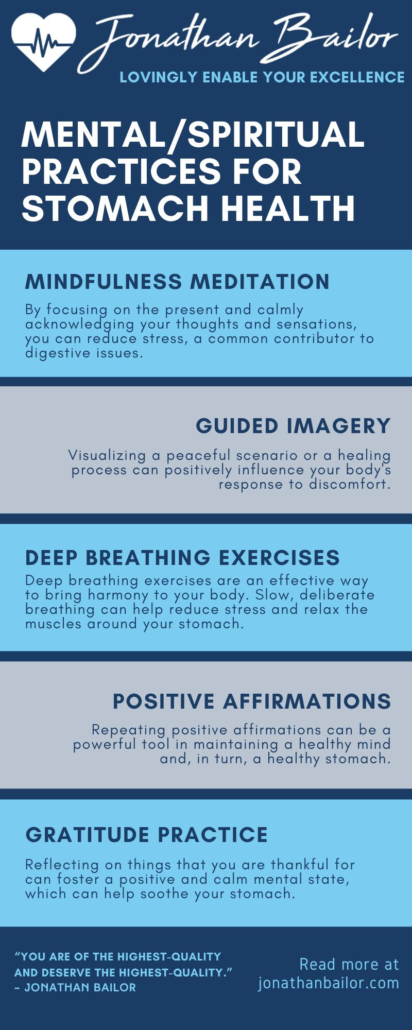21 Natural Remedies for Soothing an Upset Stomach
In the dance of daily life, an upset stomach can often feel like a misstep, an unexpected pause in the rhythm of our days. It’s a common ailment that many of us experience, yet it’s often met with uncertainty about how to find relief. In this gut health guide, Jonathan Bailor explores natural remedies that have stood the test of time, offering gentle, effective relief for an upset stomach or stomach pain.
These remedies are not just about alleviating discomfort; they’re about embracing a holistic approach to health, one that respects and works with your body’s natural processes. It’s like having a conversation with your body, understanding its needs, and responding with care and kindness.
Each suggested remedy is a testament to the wisdom of nature and the body’s remarkable ability to heal itself, given the right support. Imagine finding relief in the simplicity of your kitchen cupboard or the freshness of your garden—it’s about turning to the earth’s bounty for answers.
Sharing these remedies isn’t just about spreading knowledge; it’s about sharing a message of care and compassion. Whether it’s through a social media post or a thoughtful email, passing on these tips can help friends and family find comfort in nature’s embrace. It’s an invitation to explore gentle, natural ways to soothe a stomach ache—a journey worth taking and sharing. Let’s step into this world of natural healing together, discovering remedies that not only soothe your stomach but also nurture your overall well-being.
Harmonizing Life: Lifestyle Adjustments for Stomach Comfort
When it comes to soothing an upset stomach or severe abdominal pain, the rhythm of our lifestyle plays a crucial role. Beyond what we eat or the exercises we perform, there’s a broader spectrum of our daily routine that can influence our digestive comfort. These lifestyle changes are like subtle tunes, each playing its part in the symphony of our well-being. They’re not about grand gestures but rather small, thoughtful adjustments that create a more harmonious living environment conducive to a calm and contented stomach.
Let’s explore some lifestyle changes that, while seemingly simple, can have a profound impact on your digestive ease.
1. Regular Meal Schedules: The Tempo of Eating
Establishing a regular eating schedule is like setting a soothing rhythm for your digestive system. Eating at consistent times each day helps regulate your body’s digestive processes, reducing the likelihood of stomach upset. This regularity is like a gentle wave, guiding the digestive system and ensuring smoother functioning.
2. Mindful Eating Environment: The Ambiance of Nourishment
Creating a peaceful eating environment can significantly influence how your stomach feels post-meal. Eating in a calm, relaxed setting allows you to enjoy your meals without rush or stress. This serene ambiance is akin to a soothing melody, encouraging better digestion and a more contented stomach.
3. Prioritizing Sleep: The Restful Retreat
Quality sleep is like a nightly retreat for your body, giving your digestive system a chance to rest and rejuvenate. Ensuring a regular sleep pattern and a comfortable sleeping environment can help reduce digestive disturbances. It’s about giving your body the restful pause it needs to support overall digestive health, which can reduce episodes of stomach aches
4. Hydration Outside Meals: The Gentle Flow
Staying hydrated throughout the day, but outside of meal times, can help maintain digestive balance. Drinking water separately from meals prevents diluting stomach acids, which are essential for proper digestion. This practice is like a gentle stream, steadily supporting your body’s needs without disrupting the digestive process, thus helping soothe digestive symptoms.
5. Dressing Comfortably: The Ease of Attire
Wearing comfortable, non-restrictive clothing, especially around the waist, can make a surprising difference in how your stomach feels. Tight clothing can constrict your abdominal area, potentially leading to abdominal discomfort. Opting for comfort is like giving your body the freedom to move and function without unnecessary pressure.
By incorporating these lifestyle changes, we’re not just addressing the symptoms of an upset stomach; we’re nurturing an environment that supports lasting digestive comfort. Each small adjustment is a step towards a more balanced, stomach-friendly lifestyle.
Remember, it’s the harmony of these changes that sings the sweetest tune for our well-being.

Feeling Better Is Priceless, That's Why We Don't Put A Price On It!
“It’s Like A Free and Medically Valid Version of Noom and Weight Watchers Online”
~ Dr. Doctor Matthew Oleshiak, MD
Click the 'LEARN MORE' button below for free lifetime access to the fast fix program developed by Jonathan and top Ivy League Medical Doctors
LEARN MOREP.S. It's not a free trial. It's not part of the program for free. The entire program is free, forever, for real! No credit card needed.
Nourishing Serenity: Dietary Adjustments for Stomach Ease
In the quest for a calm and comfortable stomach, the food we choose to consume plays a melodious tune. It’s about creating a dietary harmony that resonates with our digestive system, offering relief and comfort. Just as a beautifully composed piece of music can soothe the soul, the right dietary choices can soothe an upset stomach and ease stomach pain. This journey isn’t about restrictive eating; it’s about making mindful choices that are in tune with your body’s needs.
Here are some dietary adjustments that can help alleviate stomach discomfort, each one a note in the symphony of digestive wellness.
1. Embrace Ginger: Nature’s Soothing Root
Ginger is like a gentle lullaby for an upset stomach. Its natural properties can help ease nausea and aid digestion. Incorporating a small amount of fresh ginger into your diet, perhaps in a soothing ginger tea or as a spice in your meals, can provide a comforting, warming effect that gently eases stomach discomfort. If you have the stomach flu, drinking a glass of ginger ale can also help soothe an upset stomach and relieve nausea and vomiting.
2. Herbal Teas: The Gentle Infusion
Herbal teas such as peppermint, chamomile, licorice root, or fennel are like a soft embrace for your digestive system. Chamomile tea is particularly soothing and can help your stomach muscles relax. A drop or two of peppermint oil in a cup of tea can also help reduce nausea and ease prolonged vomiting. These teas can help relax the muscles in your digestive tract and reduce bloating. Sipping on a warm cup of herbal tea is not just a comforting ritual; it’s a simple, natural way to soothe your stomach.
3. Probiotic-Rich Foods: The Balancers of Gut Harmony
Probiotic-rich foods like yogurt, kefir, and fermented vegetables can help maintain a healthy balance in your gut flora. This balance is essential for a well-functioning digestive system. Including these foods in your diet is like adding a chorus of beneficial bacteria that sing in harmony with your digestive health.
4. Lean Proteins: The Gentle Strength
Lean proteins such as chicken, turkey, and fish are easy on the stomach and can be an important part of a soothing diet. They provide the necessary nutrients without overburdening your digestive system. Think of lean proteins as a gentle yet strong foundation for your meals, supporting your stomach’s health.
5. Avoiding Fatty Foods: The Lightness of Being
Reducing the intake of fatty foods can help alleviate stomach discomfort. High-fat foods can slow down digestion and may cause bloating. Choosing lighter, less fatty meals is like giving your digestive system a lighter load to carry, easing its journey.
6. Smaller, Frequent Meals: The Rhythm of Eating
Eating smaller, more frequent meals can help manage stomach discomfort. Large meals can overwhelm your digestive system, leading to discomfort. It’s about finding a gentle rhythm in your eating habits—one that keeps your digestive system moving smoothly without overburdening it.
7. Hydration with Caution: The Art of Sipping
While staying hydrated to avoid dehydration is essential, how and when you drink fluids can impact your stomach. Drinking too much liquid with meals can dilute stomach acid, hindering digestion. Sipping fluids between meals is like a delicate balancing act, ensuring hydration without disrupting the digestive process.
By embracing these dietary changes, you’re not just addressing an upset stomach; you’re tuning into your body’s needs, creating a dietary melody that promotes comfort and health. It’s about making choices that resonate with your well-being, each one a harmonious note in the song of digestive tranquility.

Gentle Movements: Physical Activities for Stomach Comfort
In the symphony of soothing an upset stomach, the gentle rhythm of physical activity plays a crucial role. Just as a melody can uplift our spirits, the right kind of movement can uplift our digestive health. It’s about choosing activities that are in harmony with our body, particularly our stomach. These aren’t high-intensity exercises but gentle motions that aid in digestion and bring comfort. Let’s explore some physical activities that, while gentle and unassuming, can make a significant difference in easing stomach discomfort. Each activity is like a soothing note, contributing to the overall wellness of our digestive system.
1. Gentle Walking: The Soothing Stride
A leisurely walk is like a gentle caress for your digestive system. Walking after a meal, even for a short duration, can aid digestion and reduce feelings of fullness or bloating. It’s a simple, yet effective way to encourage gastric mobility, helping to move food through your digestive tract more efficiently.
2. Yoga: The Harmonious Bend
Certain yoga poses are like a soothing melody for your stomach. Gentle yoga, with its emphasis on stretching and relaxing the body, can help ease digestive discomfort. Poses like the standing forward bend or seated twist can gently massage your abdominal organs, promoting relief and aiding in digestion.
3. Tai Chi: The Flowing Movement
Tai Chi, with its slow and fluid movements, is akin to a flowing river that gently carves its path through the landscape. This gentle martial art can help reduce stress, which is often linked to digestive problems. The smooth, flowing movements of Tai Chi can help stimulate digestion and bring a sense of calm to your body.
4. Light Stretching: The Gentle Unwind
Engaging in light stretching exercises can be like a gentle unwrapping of tension within your body. Simple stretches, particularly those focusing on the abdominal area, can help relieve tightness and promote digestive comfort. It’s about giving your body the space to relax and rejuvenate, supporting your digestive health.
Incorporating these gentle physical activities into your routine can be like adding soft, soothing brushstrokes to the canvas of your health. They offer a way to support your digestive system, bringing relief and comfort to an upset stomach. Remember, it’s not about the intensity of the movement but the quality and the gentle care it provides to your body.

Inner Calm, Digestive Ease: Mental and Spiritual Practices for Stomach Health
In the journey toward soothing an upset stomach, the path isn’t just paved with physical remedies but also with the nurturing of our mental and spiritual well-being. Our inner state, the tranquility of our minds, and the peace in our spirits can have a profound effect on our digestive health. These mental and spiritual changes are like gentle whispers, offering comfort and balance to our internal systems. Let’s embrace some mental and spiritual practices that, while intangible, can have a tangible effect on soothing stomach discomfort. Each practice is a step toward aligning our inner peace with our physical health.
1. Mindfulness Meditation: The Tranquil Mind
Practicing mindfulness meditation can be like a serene voyage into your inner self, offering relief not just to your mind but also to your stomach. By focusing on the present and calmly acknowledging your thoughts and sensations, you can reduce stress, a common contributor to digestive issues. This peaceful state of being can help relax your digestive system, easing discomfort.
2. Guided Imagery: The Soothing Scenario
Engaging in guided imagery is like painting a calming picture with your mind, one where your stomach feels comfortable and at ease. Visualizing a peaceful scenario or a healing process can positively influence your body’s response to discomfort. This practice is about creating a mental space where wellness is the focus, offering a gentle respite for your digestive system.
3. Deep Breathing Exercises: Rhythmic Relief
Deep breathing exercises are a simple yet effective way to bring harmony to your body. Slow, deliberate breathing can help reduce stress and relax the muscles around your stomach. It’s like sending a wave of calm through your body, easing tension that can contribute to stomach discomfort.
4. Positive Affirmations: The Words of Wellness
Repeating positive affirmations can be a powerful tool in maintaining a healthy mind and, in turn, a healthy stomach. Affirmations like “My body is capable of healing” or “I am at peace with my body” can help create a positive mindset, which can be beneficial in managing stress and its effects on your digestive system.
5. Gratitude Practice: The Thankful Heart
Cultivating a practice of gratitude can subtly shift your focus from discomfort to appreciation, bringing a sense of overall well-being. Reflecting on aspects of your life that you are thankful for each day can foster a positive and calm mental state, which can help soothe your stomach.
These mental and spiritual practices offer a gentle approach to managing stomach discomfort, intertwining the health of the mind and spirit with the health of the body. By fostering inner calm and balance, you create an environment conducive to physical healing and comfort. Remember, the harmony between your mental, spiritual, and physical health is a symphony that plays a crucial role in your overall well-being.

Understanding Gut Health: Your Questions Answered
Navigating the intricate world of gut health can sometimes feel like deciphering a complex puzzle. It’s a topic rich with nuances, directly impacting our overall health and well-being. Understanding gut health is essential, as it is the epicenter of our body’s digestive process and significantly influences our general wellness. To help bring clarity and insight into this crucial aspect of health, here are some frequently asked questions about gut health. These answers aim to illuminate the importance of maintaining a healthy gut and provide guidance for a more balanced and harmonious bodily function.
1. What is the ‘gut microbiome’ and why is it important?
The gut microbiome refers to the vast community of microorganisms living in our digestive tract. This includes a complex array of bacteria, fungi, and viruses. It’s important because these microorganisms play a crucial role in digesting food, absorbing nutrients, and supporting our immune system. A balanced gut microbiome is essential for good digestion, preventing inflammation, and even influencing mood and mental health.
2. How can I tell if my gut is healthy?
Indicators of a healthy gut include regular bowel movements, the absence of stomach discomfort like bloating or cramps, and a general feeling of well-being. A healthy gut also contributes to clear skin, good energy levels, and a strong immune system. If you frequently experience digestive discomfort, it may be a sign that your gut health needs attention.
3. Can probiotics improve gut health?
Yes, probiotics can be beneficial for gut health. They are live microorganisms that, when consumed in adequate amounts, can provide health benefits. Probiotics help balance the gut microbiome, contributing to improved digestion, enhanced immune function, and possibly even better mental health. They can be found in fermented foods like yogurt, kefir, and sauerkraut or taken as supplements.
4. Does stress affect gut health?
Absolutely, stress can have a significant impact on gut health. It can disrupt the balance of the gut microbiome and impact the integrity of the gut lining, leading to issues like increased gut sensitivity and changes in gut motility. In fact, chronic stress is associated with irritable bowel syndrome (IBS). Managing stress through relaxation techniques, adequate sleep, and exercise can help maintain a healthy gut.
5. What dietary changes can support gut health?
Diet plays a crucial role in maintaining gut health. Consuming a diverse range of foods, particularly high-fiber vegetables, fruits, and legumes, can promote a healthy gut microbiome. It’s also beneficial to include fermented foods rich in probiotics. Apple cider vinegar is also a popular natural remedy for an upset stomach, heartburn, and acid reflux. Additionally, staying hydrated and limiting the intake of highly processed and sugary foods, as well as spicy foods, can support gut health.
Understanding and caring for your gut is an integral part of maintaining overall health and wellness. It’s about creating a balance that allows your body to function optimally, supporting not just your digestive health but your entire well-being. Remember, a healthy gut is like a foundation upon which the health of your entire body is built.
A Journey to Gut Health: Sharing the Path to Wellness
As we conclude this exploration into nurturing gut health, it’s clear that each small step—be it through diet, gentle activities, or mindful practices—intertwines to create a harmonious digestive system. These insights aren’t just for personal benefit; they’re gems of knowledge worth sharing.
I encourage you to extend this guidance to friends and family. Share these gentle approaches through social media or send a thoughtful email. Together, let’s foster a community where understanding and caring for gut health is a shared journey, a path walked in unity for better health and well-being. Your steps towards a healthier gut could inspire and guide someone in their own journey to wellness.
Feeling Better Is Priceless, That's Why We Don't Put A Price On It!
“It’s Like A Free and Medically Valid Version of Noom and Weight Watchers Online”
~ Dr. Doctor Matthew Oleshiak, MD
Click the 'LEARN MORE' button below for free lifetime access to the fast fix program developed by Jonathan and top Ivy League Medical Doctors
LEARN MOREP.S. It's not a free trial. It's not part of the program for free. The entire program is free, forever, for real! No credit card needed.




